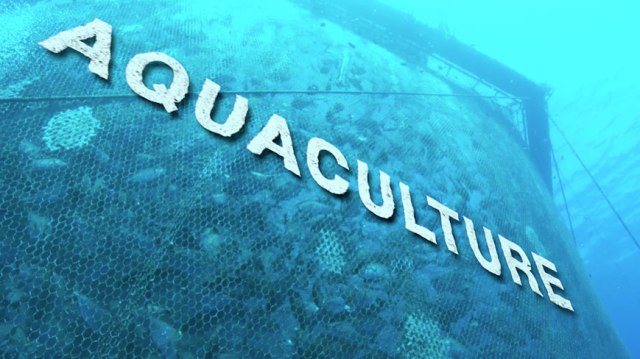
Aquaculture
Aquaculture is the process of raising, breeding, and harvesting aquatic species, both animals and plants, in controlled aquatic environments such as oceans, lakes, rivers, ponds, and streams. It serves a variety of purposes including: food production, population restoration of threatened and endangered species, aquarium construction, fish farming and restoration and habitat restoration.
The Government of India established the National Fisheries Development Board in 2006, focusing on
• Aquaculture in ponds, reservoirs
• Development of fisheries on reservoirs.
• Coastal aquaculture
• Deep sea tuna fishing and processing
Types of aquaculture
1. Mariculture- Mariculture is aquaculture using seawater. The cultivation of plants such as seaweed is also part of marine aquaculture. These marine plants and animals have many applications in manufacturing industries such as cosmetics and jewelry, where collagen from algae is used make face cream. Pearls are selected from mollusks and made into fashion items.
2. Fish farming- This is the most common type of aquaculture. It is the selective breeding of fish, either fresh or saltwater, for the purpose of creating a food source for consumption. Fish farming is heavily exploited because it allows the production of a cheap source of protein.
3. Seaweed farming- Seaweed farming is a type of aquaculture that involves the cultivation of seaweed. Algae are microbial organisms that share animal and plant characteristics. However, for economic reasons, it must be planted and harvested in large quantities. Algae today have many applications on the market.
4. Integrated multi-nutrient aquaculture- IMTA is an advanced aquaculture system in which different levels of tropism are mixed in the system to meet each other's different nutritional needs. This is a particularly effective system because it tries to simulate the ecosystem that exists in a natural habitat. IMTA utilizes these intercellular resource transfer operations to ensure maximum resource utilization by using the wastes of larger organisms as a food source for smaller organisms. This practice ensures that nutrients are recycled, which means that the process produces less waste and produces more products.
Role Desciption
- As a Fisheries Scientist or aquaculturist, you will assume one or more of the following roles and responsibilities:
- You will perform routine laboratory and diagnostic tests according to procedures.
- You will design, set up and conduct experiments related to fisheries bioanalysis and fishing technology.
- You will track genetic variations and gene expression in different fish species to determine how things are passed from generation to generation.
- You will be involved in determining the effects of pollutants on fish quality prior to harvest.
- You will be involved in the development of new methods for diagnosing and treating fish diseases and analyzing related factors such as polluted or toxic waters, etc.
- You will also help treat various diseases in aquatic animals and analyse the factors involved such as polluted or toxic water bodies etc.
- You would also assist in the processing of different type of products using advanced technology in fish farming, harvesting, and spawning.
- You would be responsible for ensuring effective and sustainable use of fishery resources and identify factors that are against it
- You would be involved in the evaluation of quality standards of processing plants
- You would also be involved in maintaining accurate and timely records of laboratory work.
- You would also evaluate data, prepare technical reports and make scientific presentations of the experiments.
Eligibility
Route to become Aqua culturist
- 10+2 with PCB
- Bachelor of Fisheries Science (B.F.Sc) – 4 years
- Masters of fisheries science (M.F.Sc) – 2 years
Significant Statistics
- English is mandatory in 10+2 in some colleges
- 50 – 60% marks are mandatory in 10+2 including English
- Must be 17 years of Age for admission to B. Sc
Pros/Cons
PROS
- Aquaculture is finding various applications in fields other than food production such as cosmetics industry, Medicines, jewelry etc. making it a lucrative option.
- With proper education and training, one can do well in international trade in these products.
CONS
- Job opportunities in govt sector is limited as very few states have fisheries department and at central govt level also vacancies are few.
- Business in this industry has regional limitations.
Leading Professions
View All
Aquaculture Farmers
These individuals are re...
8.0LPA

Aquaculture Technicians
These professionals prov...
6.0LPA

Aquaculture Researchers and Scientists
Research plays a crucial...
6.0LPA

Aquaculture Consultants
Consultants provide expe...
8.0LPA

Fish Health Managers
Fish health managers foc...
7.0LPA

Feed Manufacturers
The aquaculture industry...
5.0LPA

Hatchery Managers
Hatchery managers overse...
4.0LPA

Seafood Processors
Once harvested, aquatic ...
8.0LPA
CAREER VIDEOS
Career Path
10+2 with PCB
1 Steps
Skills
Recruitment Area
Universities and Colleges ,
Self Employment ,
Research Institutions ,
Entrepreneurship ,
Commercial fish farms and feed producers ,
Pharmaceutical and biotechnology firms ,
Marine science institutions ,
Aquariums ,
Fisheries department of state government ,
Central agencies ,
Fish processing export and import .
Recruiters
Marine Product Export Development Authority (MPEDA) ,
Export Inspection Agency (EIA) ,
Coastal Aquaculture Authority of India (CAA) ,
Food Safety and Standards Authority of India (FSSAI) ,
Fisheries Survey of India (FSI) ,
National Institute of Oceanography (NIO) ,
Indian National Centre for Ocean and Information Services (INCOIS) .
Explore Colleges
Exams & Tests
Interested? Take the next step for this career
10+2 with PCB
- 1 Steps
Skills Needed
Exams and Tests
Recruitment Area
Universities and Colleges ,
Self Employment ,
Research Institutions ,
Entrepreneurship ,
Commercial fish farms and feed producers ,
Pharmaceutical and biotechnology firms ,
Marine science institutions ,
Aquariums ,
Fisheries department of state government ,
Central agencies ,
Fish processing export and import .
Recruiters
Marine Product Export Development Authority (MPEDA) ,
Export Inspection Agency (EIA) ,
Coastal Aquaculture Authority of India (CAA) ,
Food Safety and Standards Authority of India (FSSAI) ,
Fisheries Survey of India (FSI) ,
National Institute of Oceanography (NIO) ,
Indian National Centre for Ocean and Information Services (INCOIS) .



















